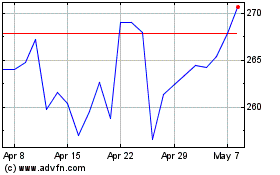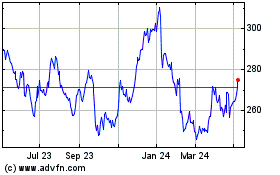UK Grocers Relieved by Late-Christmas Shopping But Discounters Gain Ground
11 January 2019 - 3:54AM
Dow Jones News
--Tesco beat analyst expectations for sales growth in its
third-quarter and Christmas trading update, sending U.K.
supermarket stocks higher.
--Tesco highlighted stronger growth in the late-Christmas
period, suggesting shoppers spent more in December following poor
November sales for British retailers.
--Recent industry figures suggest discount chains are continuing
to build market share, while the heads of supermarket chains
Sainsbury's and Morrisons have warned of Brexit's potential effect
on the industry.
By Adam Clark
A late surge in Christmas sales meant the U.K.'s largest
supermarkets avoided the worst of the crisis in the retail sector,
but concerns over customers turning toward lower-cost rivals are
intensifying as Brexit uncertainty weighs on economic
confidence.
Tesco PLC (TSCO.LN), the U.K.'s largest supermarket chain,
boosted investor confidence on Thursday by beating analyst
expectations for both its third-quarter and Christmas sales. A 2.6%
increase in like-for-like sales in the six weeks to Jan. 5
suggested customers returned to spending after reports of a weak
November for British retailers. Chief Executive David Lewis told
analysts that Tesco had achieved its highest rate of Christmas
growth since 2009, without relying heavily on promotional
activity.
The results sent Tesco's stock up about 2% toward the close of
the session, among the best performers in the FTSE 100. It also
boosted sentiment toward listed rivals J Sainsbury PLC (SBRY.LN)
and Wm. Morrison Supermarkets PLC (MRW.LN) which disappointed
investors in their own Christmas trading updates earlier in the
week.
Sainsbury's, the second-largest U.K. grocer, was particularly
hard hit on Wednesday when it reported a 1.1% drop in like-for-like
sales, excluding fuel, for the 15 weeks to Jan. 5. The company said
the figures were affected by the inclusion of November, when its
decision to opt out of Black Friday promotions hit its
general-merchandise business, including catalogue retailer
Argos.
Sainsbury's Chief Executive Mike Coupe also worried investors
when he said customers had gone for cheaper options during the
quarter. Figures from consultancy Kantar earlier in the week showed
German discount chains Lidl and Aldi took a record combined market
share of 12.8% over the Christmas period.
Mr. Coupe warned that a hard Brexit in which the U.K. fails to
secure a trade deal with the European Union before exiting the bloc
would be a "significant operational challenge" for the retail
industry.
Morrisons Chief Executive David Potts also highlighted hesitant
consumer spending over the festive period and Brexit concerns.
"I think from the country's point of view, entering relatively
unchartered territories with regard to the outcomes from Brexit,
then it would be entirely natural for consumers to feel a bit more
cautious," he said.
Despite such concerns, all three of the listed supermarkets have
outperformed the FTSE 100 over the medium-term with the large-cap
index having fallen 11% over the last year. Sainsbury's is up 8.4%
over the same period, having gained on its prospective merger with
Walmart Inc.'s (WMT) Asda, while Tesco is up 1.8%, and Morrisons is
down 4.5%.
Write to Adam Clark at adam.clark@dowjones.com
(END) Dow Jones Newswires
January 10, 2019 11:39 ET (16:39 GMT)
Copyright (c) 2019 Dow Jones & Company, Inc.
Sainsbury (j) (LSE:SBRY)
Historical Stock Chart
From Apr 2024 to May 2024

Sainsbury (j) (LSE:SBRY)
Historical Stock Chart
From May 2023 to May 2024
